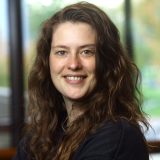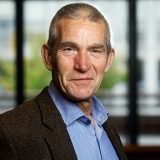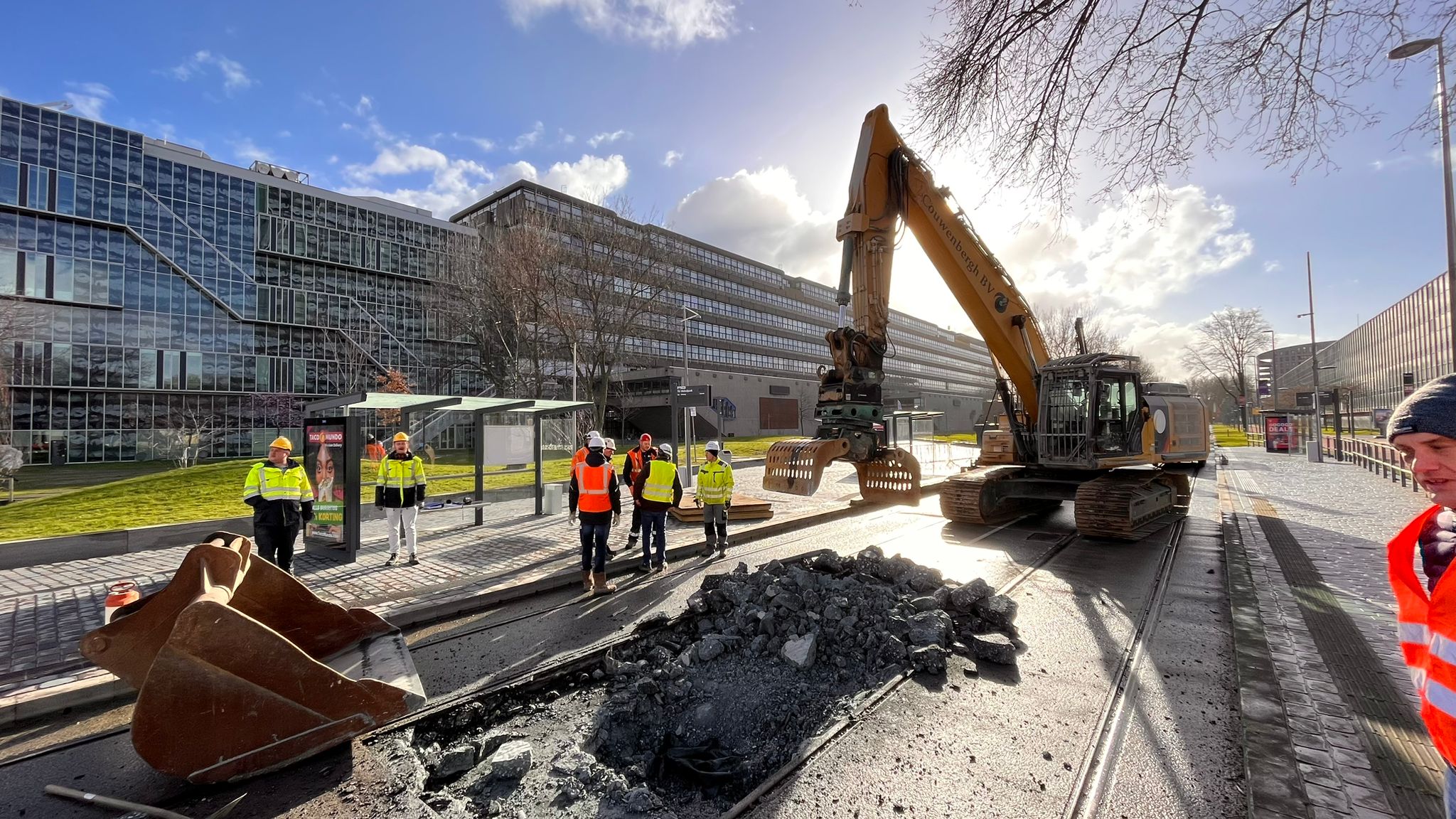Which topics attracted a lot of readers in 2023? Delta listed them for you.
In preparation for the real thing, a small trial demolition took place earlier. (Photo: M. van Bekkum)
Science
- TU Delft will have ‘the most robust tram line in Europe’, noted Delta at the end of April in the best read science piece of 2023 about tram 19. It is a case file that has interested campus visitors since 2001. When the article was published, it seemed feasible that the tram would be running across campus in the spring of 2024. Unfortunately, work has again stopped because of supply problems
- Squeaking, humming, buzzing, our article about tinnitus (ringing in the ears), appealed to a lot of people. What most found interesting was the news that researcher Wouter Serdijn (Faculty of Electrical Engineering, Mathematics and Computer Science) and the BRAI3N clinic in Ghent, Belgium, were working on a therapy combining electrical pulses and sound.
- It is a modern dilemma: may or should academics take positions in societal debates. Researchers Riccardo Riva and Wim Uijttewaal explain why they took part in a climate demonstration on and around the A12 in The Hague in Professor wants to keep toga dry at climate demonstration. Both work at the Faculty of Civil Engineering and Geosciences.
- The return of Quantum Professor Leo Kouwenhoven to TU Delft was only made known around Sinterklaas at the beginning of December, but was still one of the best read stories. Delta described the 10 year long rollercoaster ride from royal visit to an investigation into scientific integrity.
- And academics again felt obliged to take a position in a societal debate. After the PVV (Party for Freedom) emerged as the biggest party in the elections, many administrators in higher education pointed to the power of internationalisation and connection. As did TU Delft Rector Tim van der Hagen.
(Off) campus and student life
- Paternalism and unequal power relationships were the reasons for planetary scientist Daphne Stam to leave Aerospace Engineering. In Delta’s best read Campus article, she explains what preceded her resignation. ‘Decisions were taken about me all the time without my being consulted.’
- Put ‘nude’ in the title and people will click on it. The Executive Board excludes Wolbodo from the OWee because of nude model article reached second place. It was about a playful action by Wolbodo, the ‘people’s association’, in which a workshop at the Ladies Intro for ladies on drawing live models used a nude male model on the grounds of the association’s artistic nature. But this was counterproductive.
- The notification that the Municipality of Delft wanted to bring the OWee forward to the last week of the school holidays so that citizens would experience less disturbance caused an upheaval at the end of January. Apart from organisational inconvenience, the decision led to fewer new members joining student associations.
- The End Fossil pressure group wants TU Delft to end partnerships with the fossil fuel industry. In pushing their demand, they occupied the Pulse academic building in May. Delta kept a well-read live blog and reported that the last protester left the building under police control at around half past twelve at night.
- Useful and completely legal, Ellen Pruijn (TU Eindhoven), a bachelor’s student, thought up a trick to receive a basic grant. In her case about EUR 3,400. She had her student grant stopped for a couple of months only to resume it in September – but then when the basic grant returned. Read about it here (in Dutch).
Opinion
- Dap Hartmann returned as a columnist at the beginning of this year. His first article, about the new alcohol policy on campus, was immediately the best read opinion piece of 2023. Cheers!
- For years, Tim de Zeeuw, a Professor of Astronomy at the University of Leiden, was the perpetrator of serious transgressive behaviour. The university got rid of him and several organisations broke their links with him. Did De Zeeuw really do harmful things that justified these harsh sanctions? If so, Dap Hartmann wants this to be made
- A hat trick for Hartmann. ‘A real feast for the eyes’, he calls TU Delft’s new light blue sustainable plastic cutlery He outlines his opinions in detail in this column.
- As a doctoral candidate whose research is partly financed by Shell, Hugo-Pieter Iglesias van Montfort has some questions and comments for the End Fossil climate activists.
- In an open letter, the Board of Ibn Firnas, the Islamic student association, asks the Executive Board to stay neutral towards the war in the Middle East.
Education
- Artificial intelligence that helps students do their writing and programming assignments: the much talked about ChatGPT can do this. Are TU Delft students using it responsibly and how should teachers handle it?
- The AthenaStudies company uses study groups on WhatsApp to promote their exam training and other products. Director of Education Ruud Balkenende (Industrial Design Engineering) calls it ‘morally reprehensible’ and it annoys TU Delft students. “I understand that AthenaStudies can help students prepare for exams, but they do this in such a pushy way.”
- Minister Dijkgraaf’s bombshell. The Minister of Education announced that he intends to lower the binding recommendation on the continuation of studies to a 30 point maximum as of the 2025/2026 academic year. This should help ‘improve student well-being’. The Executive Board and the Student Council consider it a bad idea.
- TU Delft plans to open a branch in Rotterdam which, over time, will be ‘a full campus with a substantial number of students’. The Rotterdam branch is part of the Contouren 2030 plan that combines the growth of TU Delft with less pressure on the TU Delft campus. Caspar Chorus (Dean of the Faculty of Industrial Design Engineering) and Han Derkx (former IT Director) are sent ahead as scouts. They will examine new degree programmes and their associated research and innovation activities.
- The gains for PVV (Party for Freedom) and NSC (New Social Contract) in the House of Representatives elections could have consequences for higher education. Both parties want to stop internationalisation. The parties believe that international students will stay away of their own accord if they do not speak the language. In the run-up to the elections, NSC party leader Pieter Omtzigt called for Dutch to be the teaching medium at universities within three or four years.

Marjolein van der Veldt
m.vanderveldt@tudelft.nl

Jos Wassink
j.w.wassink@tudelft.nl



Comments are closed.